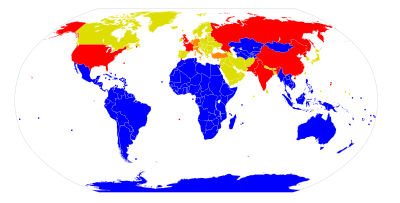- Mongolian Nuclear-Weapons-Free Status
-
In 1992, Mongolian President Punsalmaagiin Ochirbat announced that his country would seek to become a one-state Nuclear-Weapon-Free Zone (NWFZ). The last Russian troops had left the country that same year, and Mongolia perceived a change in its geopolitical status and an opportunity for neutrality.
The initiative to become a Nuclear-Weapon-Free Zone was well-received by Mongolia's neighbors, the Russian Federation and the People's Republic of China (both nuclear weapons states), as well as by the world community at large, despite being somewhat unorthodox. Previously, NWFZs had been composed of a group of countries, although the possibility of single-state zones had been long recognized. United Nations General Assembly Resolution 3261 F of December 9, 1974, states that "obligations relating to the establishment of nuclear-weapon-free zones may be assumed not only by groups of states, including entire continents or large geographical regions, but also by small groups of States and even individual countries."
Mongolia's drive for international recognition yielded fruit in Resolution 53/77 D [1], which was adopted by the General Assembly on December 4, 1998, which welcomed Mongolia's goal, and put it on the agenda for the next meeting.
On February 28, 2000, the Mongolian ambassador to the United Nations Jargalsaikhan Enkhsaikhan presented a letter [2] outlining the Mongolian de-nuclearization law, which was then circulated as A/55/56 S/2000/160. At this stage, it appears that the international recognition of Mongolia's nuclear-weapons-free status is complete.
During two meetings held in February and in July 2006, particular attention was paid to Mongolia's economic and ecological vulnerabilities and security, and the implementation of General Assembly resolution 59/73.
External links
- The Case For the Single-State Nuclear-Weapon-Free Zone An article produced by the Mongolian mission to the UN.
Categories:- Nuclear weapons policy
- Foreign relations of Mongolia
- Nuclear-weapon-free zones
Wikimedia Foundation. 2010.

